(完整版)外研社小学英语(一年级起点)四年级下知识点整理
外研版小学四年级英语下学期知识点总结
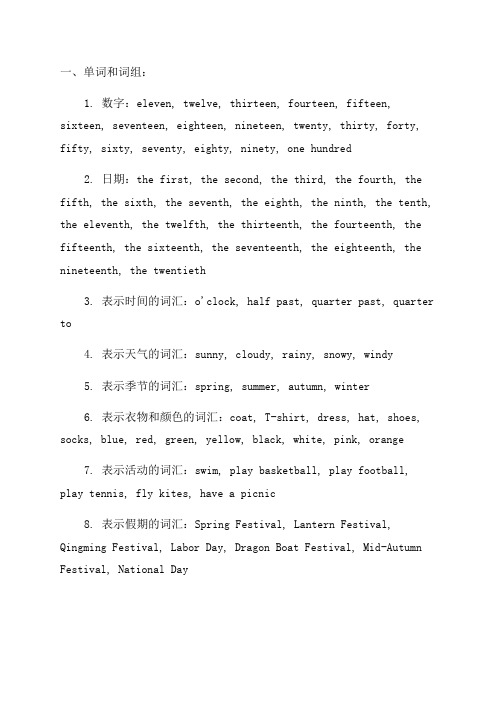
一、单词和词组:1. 数字:eleven, twelve, thirteen, fourteen, fifteen, sixteen, seventeen, eighteen, nineteen, twenty, thirty, forty, fifty, sixty, seventy, eighty, ninety, one hundred2. 日期:the first, the second, the third, the fourth, the fifth, the sixth, the seventh, the eighth, the ninth, the tenth, the eleventh, the twelfth, the thirteenth, the fourteenth, the fifteenth, the sixteenth, the seventeenth, the eighteenth, the nineteenth, the twentieth3. 表示时间的词汇:o'clock, half past, quarter past, quarter to4. 表示天气的词汇:sunny, cloudy, rainy, snowy, windy5. 表示季节的词汇:spring, summer, autumn, winter6. 表示衣物和颜色的词汇:coat, T-shirt, dress, hat, shoes, socks, blue, red, green, yellow, black, white, pink, orange7. 表示活动的词汇:swim, play basketball, play football, play tennis, fly kites, have a picnic8. 表示假期的词汇:Spring Festival, Lantern Festival, Qingming Festival, Labor Day, Dragon Boat Festival, Mid-Autumn Festival, National Day9. 形容词:big, small, tall, short, long, short, thin, fat, heavy, light, strong, weak, fast, slow, happy, sad, angry, hungry, thirsty, excited, scared, tired10. 情态动词:can, can't, could, couldn't, may, may not,will, won't, shall, shall not, must, must not二、基本句型和语法:1. 一般疑问句:Is it...? Are you...? Do you like...? Does he have...?2. 肯定回答:Yes, it is. Yes, I am. Yes, I do. Yes, he does.3. 否定回答:No, it isn't. No, I'm not. No, I don't. No, he doesn't.4.一般现在时的肯定句:主语+动词原形+其他5. 一般现在时的否定句:主语 + 动词原形 + not + 其他6. 一般现在时的一般疑问句:Do/Does + 主语 + 动词原形 + 其他?7. 一般现在时的特殊疑问句:Wh- + do/does + 主语 + 动词原形 + 其他?8. there is/there are 句型:There is + 单数名词 + 其他;There are + 复数名词 + 其他9. can/can't 句型:主语 + can/can't + 动词原形 + 其他10. could/couldn't 句型:主语 + could/couldn't + 动词原形 +其他11. can/could 提示:Can you...? Could you...? Yes, I can. Yes, I could.12. may/may not 句型:主语 + may/may not + 动词原形 + 其他13. will/won't 句型:主语 + will/won't + 动词原形 + 其他14. shall/shall not 句型:主语 + shall/shall not + 动词原形+ 其他15. must/must not 句型:主语 + must/must not + 动词原形 + 其他三、课文内容:1. Unit 1: How Do You Go There?(交通工具的使用方式)2. Unit 2: How Was Your Day Yesterday?(过去一天的活动)3. Unit 3: What's Your Hobby?(运动和爱好)4. Unit 4: What's the Day Today?(日期和天气)5. Unit 5: What Season Do You Like?(季节和天气)6. Unit 6: What Are You Wearing?(衣物和颜色)7. Unit 7: Can You Swim?(运动技能)8. Unit 8: What Did You Do in the Holidays?(假期活动)9. Unit 9: Whose Is It?(物品所有者)10. Unit 10: What Can You Do?(能力和兴趣)四、日常对话和口语表达:1. 问候:Hello! Hi! Good morning! Good afternoon! Good evening! Nice to meet you!2. 自我介绍:My name is... I am... years old. I am from...3. 询问他人的姓名和年龄:What's your name? How old are you?4. 询问他人的住所:Where do you live?5. 询问他人的过去活动:What did you do yesterday? Did you...?6. 询问他人的兴趣爱好:What's your hobby? Do you like...?7. 询问日期和天气:What's the day today? What's the weather like today?8. 询问季节和喜好:What season do you like?9. 询问衣物的颜色和穿着:What color is it? What are you wearing?10. 询问他人的能力:Can you...?以上就是外研版小学四年级英语下学期知识点的总结。
(完整版)四年级英语外研版下册知识点总结

外研版四年级英语下册知识点总结Module 1重点单词: nice 好的友善的 a bit 有一点 shy 害羞的 clever 聪明的 aunt 姨姑naughty 淘气的 little 小的年幼的 cute 可爱的 uncle 叔舅短语1、my friends 我的朋友们2、a bit shy 一点儿害羞的 2、a nice teacher 一位友好的老师4、a clever pupil 一个聪明的小学生5、a very naughty bird 一只非常淘气的鸟儿6 my big brother我的大兄弟(哥哥) 7、my little sister我的小妹妹重点句型:1. She is a nice teacher. 她是一位友善的老师。
2. Parrot is very naughty . 鹦鹉非常淘气。
3. Xiaoyong is a very clever boy. 小勇是一个非常聪明的男孩。
4. This is my mother. She is very nice.这是我妈妈,她很好。
Module 2重点单词: about 关于 beautiful 美丽的 long 长的 many 很多 old 古老的 famous 著名的短语1、一本关于伦敦的书 a book about London2、来自…(是…人)be from…3、英国的首都 the capital of England4、白金汉宫 Buckingham Palace5、女王的房子 the Queen’s house6、泰晤士河 the River Thames7、在河上 on the river 8、大本钟 Big Ben 9、海德公园 Hyde Park 10、塔桥 Tower Bridge重点句型:1. This is a book about London. 这是一本关于伦敦的书。
2. London is a big city. 伦敦是个大城市。
外研社小学英语一年级起点四年级下册 Module5 语法复习
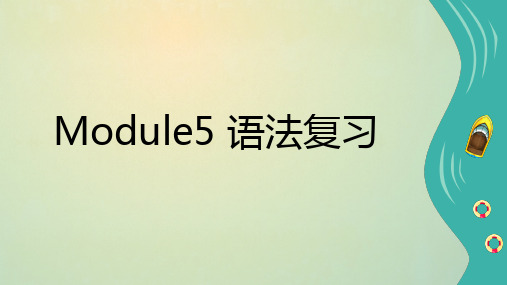
目录 Part 1人称代词 Part 2 单数和复数 Part 3 主谓一致
Part 1人称代词
I
we
you
you
he
she
it
they
I we you she he it they
我们 你;你们 她 它 他 他们 我
Part 2 单数和复数
单数和复数的区别
填写正确的be动词
8.The bad man __is____(be)angry. 9.These machines __a_re___(be)dangerous. 10.The hat _i_s____(be)pink. 11.The computer __is____(be)expensive. 12.The pen _i_s____(be)cheap. 13.The bag _is_____(be)blue. 14.Amy’s trousers __a_r_e__(be)beautiful.
全写 I am she is he is it is you are we are they are
中文 我是 她是 他是 它是 你是,你们是 我们是 他们是
缩写 I’m she’s he’s it’s you’re we’re they’re
填写正确的be动词
1.I __a_m___(be) a girl. 2.We _a_r_e__(be) from China. 3.She __is____(be) angry. 4.He _i_s____(be) a bad man. 5.It __is____(be) magic. 6.They _a_r_e___(be) hungry. 7.You _a_r_e___(be) thirsty
外研版英语教材》(新标准)(一起)四年级下册单词表知识点

外研版英语教材》(新标准)(一起)四年级下册单词表知识点1.It’s a bargain.这很便宜。
2.How much does it cost?它多少钱?3.Can you send me an email?你可以给我发一封邮件吗?4.It’s too XXX.太贵了。
5.It’s worth it.它值得这个价钱。
6.Pay in cash.用现金支付。
7.Can I have a discount?我能打折吗?8.It XXX.它价值一百一十八元。
三、句子It’XXX.这是一笔好交易。
It’s too XXX for me.对我来说太贵了。
Can you send me an email about the details?你能给我发一封邮件详细说明吗?I can’t afford it.我买不起。
It’XXX.它值得这个价钱。
I’ll pay in cash.我会用现金支付。
Can you give me a discount?你能给我打个折吗?How much does it cost?它多少钱?It XXX.它价值一百一十八元。
四、语法点询问价格:How much does it cost? 表示价格:It costs + 价格表示便宜:cheap,It’s a bargain.表示贵:expensive,It’XXX.请求打折:Can I have a discount?1.XXX。
2.Be quiet。
3.What color。
4.Buy a computer for me。
st year。
6.Send an email to you。
7.It costs 100 yuan。
8.It's cheap。
9.It's XXX。
10.It's XXX。
三、句子This computer is beautiful。
It's purple in color。
四年级下册英语外研一起点知识要点汇总

Contents四年级下Module 1 (1)四年级下Module 2 (3)四年级下Module 3 (7)四年级下Module 4 (10)四年级下Module 5 (13)四年级下Module 6 (17)四年级下Module 7 (22)四年级下Module 8 (27)四年级下Module 9 (31)四年级下Module10 (35)四年级下Module 1重点:Do 型祈使句让别人不要做某事的句型表达“某人可以……"的句型难点:让别人不要做某事的句型短语make crisps 制作炸薯片wash the potatoes 清洗马铃薯cut the potatoes 切马铃薯touch the machines 触摸机器a bag of crisps 一袋炸薯片feed the fish 喂鱼walk on the grass 践踏草坪play ball games 玩球类游戏write on the books 在书上写(字)惯用表达式Sorry.对不起。
Look! 看核心句型1.Don't touch the machines, please!请不要触摸这些机器解读这是劝告他人不要做某事的句子。
2.You can each have a bag of crisps.你们每个人都可以拥有一袋炸薯片。
解读这是表达“某人可以……"的句子。
了解句型1.The baby is sleeping.这个婴儿正在睡觉。
解读这是表达某人正在做某事的句子。
2.Sing for the baby! 为婴儿唱歌!解读这是建议他人做某事的 Do 型肯定祈使句。
Unit 1 知识点精析1.Don't touch the machines, please!请不要触摸这些机器。
这是劝告他人不要做某事的句子。
【句型结构】Don't+动词(短语)原形(+其他)【噩点解析】这是一个 Do 型祈使句的否定形式。
外研社(一年级起)英语四年级下册学习重点整理
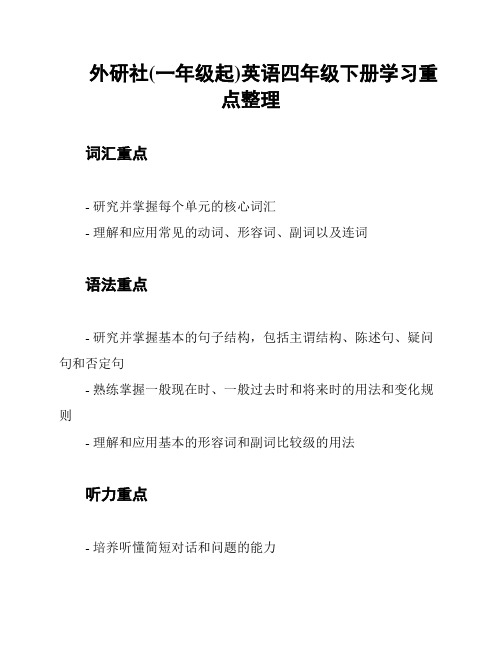
外研社(一年级起)英语四年级下册学习重
点整理
词汇重点
- 研究并掌握每个单元的核心词汇
- 理解和应用常见的动词、形容词、副词以及连词
语法重点
- 研究并掌握基本的句子结构,包括主谓结构、陈述句、疑问句和否定句
- 熟练掌握一般现在时、一般过去时和将来时的用法和变化规则
- 理解和应用基本的形容词和副词比较级的用法
听力重点
- 培养听懂简短对话和问题的能力
- 提高听懂日常生活中关于时间、地点、人物和活动的问题的能力
- 研究听懂简短故事并提取关键信息的能力
口语重点
- 练运用学过的词汇和句型进行简单的日常会话
- 学会表达自己的观点、感受和喜好
- 提高与他人交流和合作的能力
阅读重点
- 通过阅读短文和故事,培养理解和抽取关键信息的能力
- 学会根据文中提供的信息回答问题
- 提高阅读时的语音和语调的表达能力
写作重点
- 练书写短文和简单的句子,描述自己的家庭、朋友和学校生活
- 学会运用所学词汇和语法结构进行基本的写作对话和情景
以上是外研社(一年级起)英语四年级下册的学习重点整理。
通过重点的学习和实践,学生们将能够提高听说读写的能力,更好地运用英语进行交流和表达。
外研社一年级起点小学四年级英语下册知识点
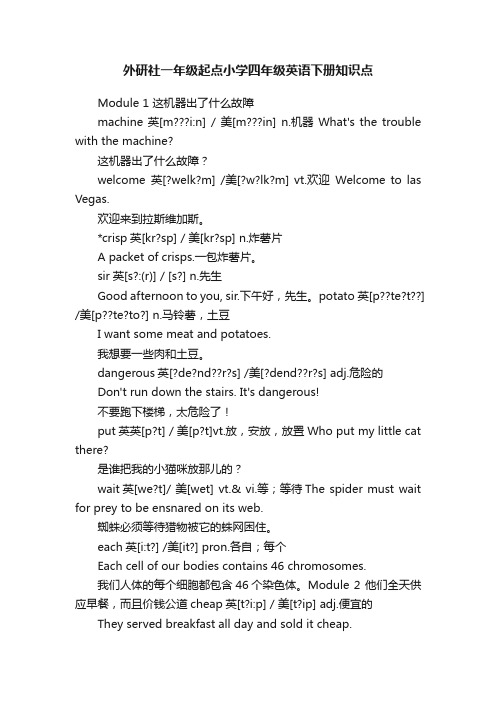
外研社一年级起点小学四年级英语下册知识点Module 1 这机器出了什么故障machine英[mi:n] / 美[min] n.机器What's the trouble with the machine?这机器出了什么故障?welcome英[?welk?m] /美[?w?lk?m] vt.欢迎Welcome to las Vegas.欢迎来到拉斯维加斯。
*crisp英[kr?sp] / 美[kr?sp] n.炸薯片A packet of crisps.一包炸薯片。
sir英[s?:(r)] / [s?] n.先生Good afternoon to you, sir.下午好,先生。
potato英[p??te?t??] /美[p??te?to?] n.马铃薯,土豆I want some meat and potatoes.我想要一些肉和土豆。
dangerous英[?de?nd??r?s] /美[?dend??r?s] adj.危险的Don't run down the stairs. It's dangerous!不要跑下楼梯,太危险了!put英英[p?t] / 美[p?t]vt.放,安放,放置Who put my little cat there?是谁把我的小猫咪放那儿的?wait英[we?t]/ 美[wet] vt.& vi.等;等待The spider must wait for prey to be ensnared on its web.蜘蛛必须等待猎物被它的蛛网困住。
each英[i:t?] /美[it?] pron.各自;每个Each cell of our bodies contains 46 chromosomes.我们人体的每个细胞都包含46个染色体。
Module 2 他们全天供应早餐,而且价钱公道cheap英[t?i:p] / 美[t?ip] adj.便宜的They served breakfast all day and sold it cheap.他们全天供应早餐,而且价钱公道。
(完整版)最新外研版小学四年级英语下册知识点归纳复习
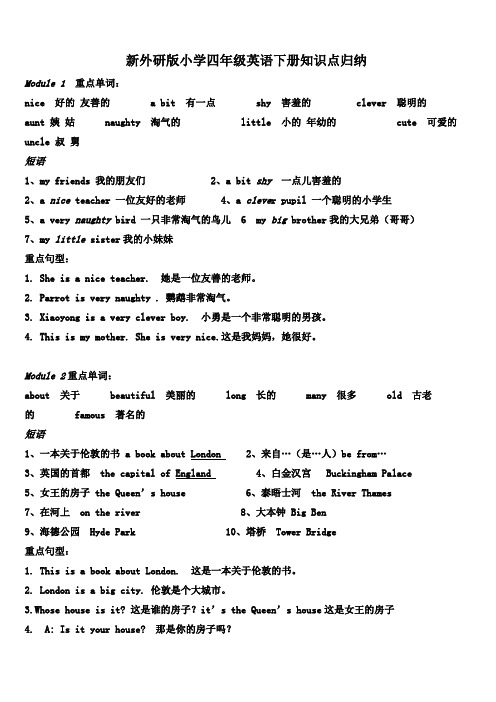
新外研版小学四年级英语下册知识点归纳Module 1 重点单词:nice 好的友善的 a bit 有一点 shy 害羞的clever 聪明的aunt 姨姑 naughty 淘气的 little 小的年幼的 cute 可爱的uncle 叔舅短语1、my friends 我的朋友们2、a bit shy 一点儿害羞的2、a nice teacher 一位友好的老师 4、a cleve r pupil 一个聪明的小学生5、a very naughty bird 一只非常淘气的鸟儿 6 my big brother我的大兄弟(哥哥)7、my little sister我的小妹妹重点句型:1. She is a nice teacher. 她是一位友善的老师。
2. Parrot is very naughty . 鹦鹉非常淘气。
3. Xiaoyong is a very clever boy. 小勇是一个非常聪明的男孩。
4. This is my mother. She is very nice.这是我妈妈,她很好。
Module 2重点单词:about 关于beautiful 美丽的long 长的many 很多old 古老的famous 著名的短语1、一本关于伦敦的书 a book about London2、来自…(是…人)be from…3、英国的首都 the capital of England4、白金汉宫 Buckingham Palace5、女王的房子 the Queen’s house6、泰晤士河 the River Thames7、在河上 on the river 8、大本钟 Big Ben9、海德公园 Hyde Park 10、塔桥 Tower Bridge重点句型:1. This is a book about London. 这是一本关于伦敦的书。
2. London is a big city. 伦敦是个大城市。
- 1、下载文档前请自行甄别文档内容的完整性,平台不提供额外的编辑、内容补充、找答案等附加服务。
- 2、"仅部分预览"的文档,不可在线预览部分如存在完整性等问题,可反馈申请退款(可完整预览的文档不适用该条件!)。
- 3、如文档侵犯您的权益,请联系客服反馈,我们会尽快为您处理(人工客服工作时间:9:00-18:30)。
英语(四年级下)主要知识点整理
(例句都是课本中原句)
1. 祈使句:表示请求、命令、建议等的句子。
祈使句不需要主语,
谓语动词用原形,句子末尾一般用感叹号。
eg: (1) Don’t walk on the grass! (否定祈使句)
(2) Let’s make a newspaper! (肯定祈使句)
2. 一般现在时:经常发生的动作或状态(常与always, usually, often, sometimes, seldom, never, every day/week/year, on Sundays ...连用)
(1) be动词的一般现在时:(比较简单)
I am, We/You/They are, He/She/It is,There is+单数名词或不可数名词, There are + 复数名词
eg: It’s not beautiful, but it’s helpful.
(2) 行为动词的一般现在时:(单数第三人称的变化是重点、易错点; 助动词用do, don’t, does, doesn’t)
eg: (1)This machine cuts the potatoes.
(2) Does he live in New York?
(3) Fish live in the river and birds live in the tree. (***注意fish单数
和复数写法一样,这里fish前面没有a, 所以是复数形式,后面接谓语动词要用原形。
另外,Sheep和deer单复数也是一样的形式)
3. 一般过去时:表示过去发生的动作或状态(常与...ago, yesterday, the day before yesterday, last week/year/month, once upon a time, one day, the next day, in 2016...连用)
(1) be动词的一般过去时:
I/He/She/It was, We/You/They were, There was+单数名词或不可数名词, There were + 复数名词
eg:Once upon a time, there was a boy. (讲故事常用说法)
(2) 行为动词的一般过去时:(助动词用did, didn’t)
①一般动词变化:
构成法:1. 动词原形+ed. 如:look--looked
2. 以e结尾的词+d. 如:live--lived
3. 以辅音字母+y结尾的词,改y为i, 再加ed.
如:study--studied, cry--cried.
4. 以重读闭音节或r音节结尾,末尾只有一个辅音字母的
词,双写这个辅音字母,再加ed. 如: clap--clapped, stop--
stopped, prefer--preferred
②不规则动词变化:如had, said, put, saw, got, ran, learnt(英式写法), bought, came, took, went等
eg1: The animals had a concert last week.
eg2: The next day, the boy ran to the village again.
eg3: What did he play yesterday?
eg4: When did you get up last Sunday? I got up at 8 o’clock.
4. 一般将来时:表示还没有发生但将要发生的事情或动作(常与tomorrow, the day after tomorrow, next year/month/week, soon, in the future, in ... minutes/hours/days...连用)
(1) Be going to+ 动词原形:多表示即将发生,最近打算、计划、安排好要做的事情,主观性较强(区分人称,be动词变化am, is, are) eg: She’s going to visit Australia.
(2) Will+动词原形:多表示即将发生的动作或状态,不受主观因素影响的单纯的将来,客观性较强(不区分人称,都用will)
(***目前小学阶段对这两种形式区分并不明显,可以互换使用)
eg: We will go to the zoo on Sunday.
5. 现在进行时:表示正在进行或发生的动作(常与now, at present, at this moment连用)
Be动词+动词的现在分词(***区分人称,注意动词的现在分词构成的特殊情况)
动词的现在分词构成法:
(1)一般规则:动词+ing, 如: work--working.
(2) 以e结尾的动词去掉e加ing. 如: live--living, have--having.
(3) 以重读闭音节或r音节结尾,末尾只有一个辅音字母的词,双写这个辅音字母,再加ing. 如: swim--swimming, clap--clapping, refer--referring.
(4) 以ie结尾的重读开音节的词,改ie为y, 再加ing. 如: die--dying. eg: (1) What’s happening now?
(2) Daming is making a card for his father.
(3) We are having a party.
6. 购物相关话题:
(1)I want to buy a pen.
(2)It’s expensive/cheap.
(3)It costs one hundred and eighteen yuan.
(4)Who wants to buy it?
7. 音乐演奏相关话题:(***演奏乐器前要加定冠词the )
(1) I played the piano yesterday.
(2) You’re playing the violin for your father.
(3) My mum and dad played in the concert.
(4) In the end, everyone clapped.
(***注意玩球类运动不能加定冠词the, eg:I played football yesterday. ) 8. 时间相关话题:
(1) What’s the time now?
(2) What time is it now?
(3) It’s 2 o’clock.
(4) Is it breakfast/lunch/dinner time now?
(5) The Chinese cartoon Shaolin Kids is on TV at 8 o’clock.
9. 方向相关话题:
(1) Where is the library?
(2) It’s in the north/south/west/east of China.
(3) I went to the north/south/west/east.
(4) Beijing is the capital of China.
10. 原因相关话题:
(1)Why do fish live in the river?
(2)Because cats can’t live in the water.。
